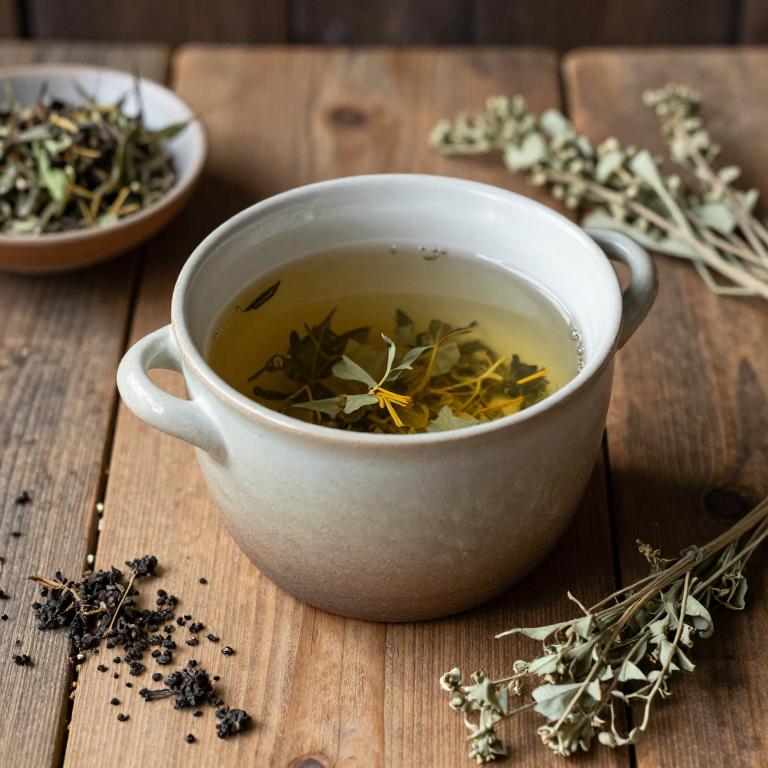10 Best Herbal Decoctions For Gastroparesis

Herbal decoctions have been explored as a complementary therapy for managing symptoms of gastroparesis, a condition characterized by delayed gastric emptying.
Certain herbs, such as ginger, fennel, and peppermint, are commonly used in decoctions to help alleviate nausea, bloating, and digestive discomfort. These herbs are believed to stimulate digestion and reduce gastrointestinal spasms, although their efficacy can vary among individuals. Preparation involves simmering the dried herbs in water for an extended period to extract their active compounds.
While herbal decoctions may offer some relief, they should be used under the guidance of a healthcare professional to ensure safety and avoid interactions with other medications.
Table of Contents
- 1. Ginger (Zingiber officinale)
- 2. Black pepper (Piper nigrum)
- 3. Turmeric (Curcuma longa)
- 4. Licorice (Glycyrrhiza glabra)
- 5. Fennel (Foeniculum vulgare)
- 6. Cumin (Cuminum cyminum)
- 7. Ceylon cinnamon (Cinnamomum verum)
- 8. Thistle (Silybum marianum)
- 9. Peppermint (Mentha piperita)
- 10. Black cumin (Nigella sativa)
1. Ginger (Zingiber officinale)

Zingiber officinale, commonly known as ginger, has been traditionally used in herbal medicine for its potential therapeutic effects on digestive health.
Herbal decoctions made from fresh or dried ginger root are often employed to alleviate symptoms associated with gastroparesis, a condition characterized by delayed gastric emptying. These decoctions are believed to stimulate digestive enzyme secretion and enhance gastrointestinal motility through their active compounds, such as gingerol and shogaol. Preliminary studies suggest that ginger may help reduce nausea and bloating, common symptoms in patients with gastroparesis.
However, while ginger is generally considered safe, individuals should consult with a healthcare provider before incorporating it into their treatment plan, especially if they are on medications or have other underlying health conditions.
2. Black pepper (Piper nigrum)

Piper nigrum, commonly known as black pepper, has been traditionally used in herbal medicine for its potential digestive benefits.
When prepared as a decoction, black pepper may help stimulate gastric motility, which is particularly beneficial for individuals with gastroparesis, a condition characterized by delayed stomach emptying. The active compound in black pepper, piperine, is believed to enhance the activity of digestive enzymes and improve the function of the gastrointestinal tract. Some preliminary studies suggest that piper nigrum decoctions might support the motility of the stomach and reduce symptoms such as bloating and nausea in gastroparesis patients.
However, more research is needed to fully understand its efficacy and safety in treating this condition.
3. Turmeric (Curcuma longa)

Curcuma longa, commonly known as turmeric, has been traditionally used in herbal medicine for its anti-inflammatory and antioxidant properties.
Recent studies suggest that curcumin, the active compound in turmeric, may help improve gastrointestinal motility and reduce inflammation in the digestive tract, making it a potential therapeutic option for gastroparesis. When prepared as a decoction, curcuma longa can be consumed as a tea or added to meals to support digestive health. However, its absorption is limited in the gastrointestinal tract, so combining it with black pepper or fat may enhance its bioavailability.
While some preliminary evidence supports its use, more clinical trials are needed to establish its efficacy and safety for managing gastroparesis.
4. Licorice (Glycyrrhiza glabra)

Glycyrrhiza glabra, commonly known as licorice root, has been traditionally used in herbal medicine for its potential benefits in digestive health.
Herbal decoctions made from Glycyrrhiza glabra may help alleviate symptoms of gastroparesis by reducing inflammation and promoting gastric motility. The active compounds in licorice, such as glycyrrhizin and flavonoids, are believed to have antispasmodic and anti-inflammatory properties that support gastrointestinal function. However, long-term use of licorice root decoctions can lead to side effects like hypertension and fluid retention due to its mineralocorticoid-like effects.
As a result, it is often recommended to use licorice in moderation and under the guidance of a healthcare professional when considering it for gastroparesis management.
5. Fennel (Foeniculum vulgare)

Foeniculum vulgare, commonly known as fennel, has been traditionally used in herbal medicine for its carminative and digestive properties.
Herbal decoctions made from the seeds of fennel are often prepared by simmering the dried seeds in water to extract their essential oils and active compounds. These decoctions may help alleviate symptoms of gastroparesis by stimulating digestive enzyme secretion and promoting gastric motility. However, while some studies suggest potential benefits, more rigorous clinical trials are needed to confirm their efficacy and safety for this condition.
As with any herbal remedy, it is advisable to consult a healthcare provider before using fennel decoctions, especially for individuals with existing medical conditions or those taking medications.
6. Cumin (Cuminum cyminum)

Cuminum cyminum, commonly known as cumin, has been traditionally used in herbal medicine for its potential gastrointestinal benefits.
Herbal decoctions made from cumin seeds may help stimulate digestive enzyme production and improve gastric motility, which is beneficial for individuals with gastroparesis. The essential oils in cumin, such as limonene and cineole, are believed to have mild spasmolytic and anti-inflammatory properties that may aid in reducing stomach discomfort. While some preliminary studies suggest cumin may support digestion, more clinical research is needed to confirm its efficacy in managing gastroparesis symptoms.
As with any herbal remedy, it is advisable to consult a healthcare provider before incorporating cumin decoctions into a treatment plan for gastroparesis.
7. Ceylon cinnamon (Cinnamomum verum)

Cinnamomum verum, commonly known as true cinnamon, has been traditionally used in herbal medicine for its potential gastrointestinal benefits.
Herbal decoctions made from cinnamon bark may help stimulate digestive motility, which is particularly beneficial for individuals with gastroparesis, a condition characterized by delayed gastric emptying. The active compounds in cinnamon, such as cinnamaldehyde and essential oils, may contribute to its effects on the digestive system by enhancing muscle contractions in the stomach and intestines. However, while some preliminary studies suggest possible efficacy, more research is needed to confirm its role in managing gastroparesis symptoms.
As with any herbal treatment, it is important to consult a healthcare provider before using cinnamon decoctions, especially for those with diabetes or on medications that interact with cinnamon.
8. Thistle (Silybum marianum)

Silybum marianum, also known as milk thistle, is a herbal remedy that has been studied for its potential benefits in managing gastroparesis, a condition characterized by delayed gastric emptying.
The active compound in milk thistle, silymarin, is believed to possess antioxidant and anti-inflammatory properties that may support digestive health. Herbal decoctions of silybum marianum are often prepared by simmering the dried seeds in water to extract the beneficial compounds. Some preliminary research suggests that these decoctions may help improve gastric motility and reduce symptoms such as nausea and bloating in individuals with gastroparesis.
However, more clinical trials are needed to confirm its efficacy and determine optimal dosing for this specific condition.
9. Peppermint (Mentha piperita)

Mentha piperita, commonly known as peppermint, has been traditionally used in herbal medicine for its soothing effects on the gastrointestinal system.
Peppermint herbal decoctions may help alleviate symptoms of gastroparesis by relaxing the smooth muscles of the stomach and intestines, thereby improving gastric motility. The active compounds in peppermint, such as menthol and methyl salicylate, possess antispasmodic and analgesic properties that can reduce cramping and discomfort associated with delayed gastric emptying. While some studies suggest potential benefits, more clinical research is needed to confirm its efficacy and safety for managing gastroparesis.
As with any herbal remedy, it is advisable to consult a healthcare provider before using peppermint decoctions, especially for individuals with existing medical conditions or those taking other medications.
10. Black cumin (Nigella sativa)

Nigella sativa, commonly known as black cumin, has been traditionally used in herbal medicine for its potential gastrointestinal benefits.
Herbal decoctions made from the seeds of Nigella sativa may help alleviate symptoms of gastroparesis by promoting gastric motility and reducing inflammation in the digestive tract. Preliminary studies suggest that the active compound thymoquinone in Nigella sativa may enhance gastrointestinal function and support digestive health. However, more clinical research is needed to fully understand its efficacy and safety for individuals with gastroparesis.
While some people report relief from symptoms when using Nigella sativa decoctions, it is important to consult a healthcare provider before incorporating it into a treatment plan.